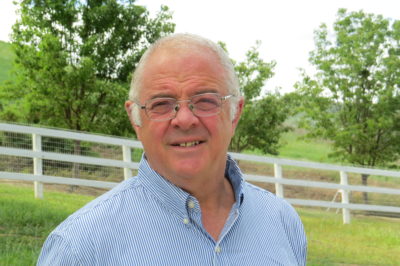Opinion: Christopher Arend responds to criticism of school board actions

Christopher Arend
I am writing this opinion piece in my capacity as just one member of the school board of the Paso Robles Joint Unified School District (the “PRJUSD”) and not on behalf of the entire school board or the PRJUSD in response to an opinion piece written by two local activists Yessenia Echevarria and Camille Katz published on Oct. 26 in the Paso Robles Daily News. They claim that there is “systemic oppression” by school leaders in Paso Robles, especially naming me and Superintendent Curt Dubost as the main villains in this fairy tale. The trite jargon of “victimhood” and hyperbole throughout their article as well as their misrepresentation of my positions on the issues and the facts are unfortunately typical for such diatribes.
Use of Spanish at board meetings:
A prime example is their discussion about using Spanish or, for that matter, any foreign language during Board meetings. I took an oath to preserve and defend the Constitution of the United States as well as the Constitution of the State of California when I became a board member. I take this commitment very seriously.
Art. III section 6 of the California Constitution states that English is the “official language” as well as the “common language” in California. The school board is accordingly required to conduct its meetings in English. Art. III section 6 subsection (c) requires the board members “to ensure that the role of English as the common language of the State of California is preserved and enhanced.” Promoting English as the common language is also an essential aspect of having an inclusive and integrated society.
An issue arose in one of my first meetings when a young lawyer addressed the Board in Spanish for about two minutes during public comment before switching to English for about another minute. I responded for roughly 20 seconds in German before switching back to English and stating that to continue in German would be impolite and defeat the purpose of communication. I continued to insist in subsequent meetings that people who are fluent in English should address the board in English. In the case of people who are not fluent in English, we have always followed the law in section 54954.3 of the California Government Code which requires us to permit people who are “non-English speakers” to address the board in other languages and use the services of a translator, including allocating to “non-English speakers” twice the time for their comments than given to English speakers. However, the law does not require the board to allow speakers to grandstand with their knowledge of a foreign language and waste everybody’s time.
Although not required by law to provide translations of our meetings into Spanish or any other foreign language, the school district incurred the expense to provide simultaneous translation services for the online broadcasts of our meeting, and I supported this measure. In the meantime, we have found that this service is only being sporadically used by one or two people during our meetings.
Ms. Echevarria has repeatedly and vociferously complained about the quality of translation provided by our certified translator. I cannot evaluate whether Ms. Echevarria’s complaints are justified because I do not speak Spanish and instead only speak English and German. In any event, my actions on this issue have been in full compliance with the law and my constitutional duty to preserve and enhance “English as the common language of the State of California.” I have always considered it important to carry out my duties, regardless of the “incoming fire”.
Critical Race Theory:
The board took over two hours of public comment and received over one hundred written comments on the resolution to ban critical race theory (“CRT”) in our schools. It was readily apparent during the public comment that especially people who argue that CRT is not being taught in public schools and that CRT only involves applying “critical thinking” to history do not know what CRT is. It would go beyond the scope of this piece to discuss the philosophical origins of CRT in Hegelian dialectic, the dialectic materialism of Karl Marx, the German post-Marxist philosophers of the “Frankfurt school” in the 1920s and the development of this “disgustingly racist ideology” in American academia where it has spread like a virus and has now contaminated our entire society. Instead, here are just a few quotes from leading proponents of CRT which easily show the divisive nature of this ideology:
- “[R]acism is ordinary … The usual way society does business…“ (Delgado/Stefancic, Critical Race Theory: An Introduction, 3rd. ed. (2017) pg. 8.) This basic premise of CRT, as expressed in the leading college textbook on the subject, means that everything in society should be viewed through the lens of race.
- “[M]inority status … brings with it a presumed competence to speak about race and racism.“ (Delgado/Stefancic, Critical Race Theory: An Introduction, 3rd. ed. (2017) This basic premise is often used in the discussion of issues of race to argue that people who are not members of minorities should have no business talking about race.
- “Racism comes out of our pores as white people. It’s the way we are.” (Robin Diangelo, the author of White Fragility, in an interview on Michigan Radio in 2015.)
- “The term [racist] applies to all white people (i.e., people of European descent) living in the United States regardless of class, gender, religion, culture or sexuality.”
(“Definitions and Descriptions of Racism”, Sharon Martinas (2015), pg. 2) - “The only remedy to stop racist discrimination is antiracist discrimination. The only remedy to past discrimination is present discrimination. The only remedy to present discrimination is future discrimination.” (Kendi, How to be an Antiracist, (2019) pg. 31) This is nothing less than a call for perpetual race-based discrimination. This is “disgustingly racist”, and nobody in their right mind would want to live in such a society.
CRT has been finding its way into grades K-12 for some time. The Hayward school district in the Bay Area just recently approved a blatantly CRT-based ethnic studies program for all grades K-12. Our resolution 21-27A adopted on 10 August 2021 (available in the FoxNews.com article on 11 August 2021) nips such efforts in the bud.
I am personally very proud of the PRJUSD resolution to ban CRT which I authored, and I was pleased to hear the three members of the board who voted against the resolution say in open session that, while opposing the resolution, they are also against CRT in our schools.
In the meantime, I have given several lectures about the substance of CRT to local groups and also groups outside our area. I would be pleased to give the lecture to any other group that is interested, including “Paso People’s Action” which Ms. Echevarria co-founded.
Resolution condemning racism and the PRJUSD ethnic studies course:
I am also personally very proud of our PRJUSD resolution condemning racism. Our resolution (which I also authored) follows the basic concept expressed so eloquently by Martin Luther King in his “I have a dream speech” in 1963: “I have a dream that my four little children will one day live in a nation where they will not be judged by the color of their skin but by the content of their character.”
I strongly supported our new ethnic studies course. “Ethnic studies” is a perfectly legitimate field of study as a history course. Our Paso Robles ethnic studies course, (1) does not have any CRT, (2) does not use hindsight bias, and (3) analyzes historic events and persons in their historic context. The course is a so-called “constructive ethnic studies” course. I have attended the class once so far, and I was very pleased with how it is going.
Glen Speck:
Contrary to what Ms. Echevarria and Ms. Katz write without ever having discussed the matter with me, I do not have any “favoritism towards a closure” of Glen Speck. The PRJUSD is still in the process of deciding how to deal with the matter. I firmly support maintaining a school on that site. One approach would be to replace the current structures that apparently cannot be economically renovated with a smaller campus to serve primarily the local neighborhood. The new school would emphasize English learning and American civics, while the dual immersion program would move to another site.
Hostile acts against “marginalized” groups:
Our resolution condemning racism clearly states that the PRJUSD does not tolerate racist conduct. I said during the meetings about the resolution that we must come down on anyone engaging in such activity “like a ton of bricks”. I am confident that our staff will act accordingly if an incident happens. If not, I want to know immediately.
The “rainbow flag” incident and a less severe incident involving a discarded rainbow mask getting thrown in another toilet resulted in disciplinary action against the involved students. The PRJUSD does not publish details about student punishment, nor are the members of the board involved until a matter is escalated to us, for example, in the case of an expulsion. My personal preference for punishment in the flag incident would have been, among other sanctions, to make the student(s) clean up the mess they made, but I doubt that this type of “restorative justice” would have been permissible.
My position about the size of a rainbow flag or banner is clear. Our schools must be inclusive for all students. The American flag is the symbol for everyone living in this country where non-citizens also enjoy the protection of our laws and institutions. Our flag is the product of a democratic process and the passing of a statute establishing the flag as our all-inclusive national symbol. We also acknowledge that at the end of the Pledge of Allegiance” with the words “with liberty and justice for all”. Therefore, no other banner or flag, especially a symbol for just one group, should be given a more predominant position in our classrooms than the American flag.
Ms. Echeverria and Ms. Katz, like so many people today, are quick to cast aspersions against those they consider to be ideological opponents. There is a lot of anger in our modern culture just looking for a target. It is a lot easier to make baseless accusations against someone for supposedly engaging in “dangerously ignorant rhetoric” or lacking character or being “devoid of integrity” than to engage in substantive debate about issues. In any event, I am always available to discuss any issue, including especially with people who have different opinions.
Signed,
Christopher Arend
Paso Robles






















